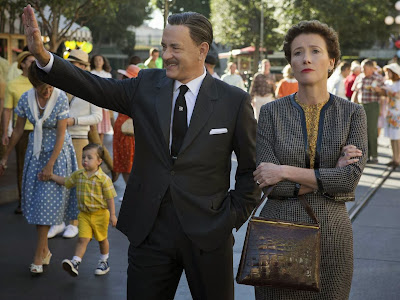Cor blimey – not Mary Poppins
And yet, the fulsome praise in the aftermath of the initial
previews suggested that my cynicism was entirely unfounded. Had Disney pulled
off the audacious trick of making a great movie out of such transparently cynical
ingredients?
The story has Mary Poppins's author (PL) Travers-ing
across the Atlantic to do battle with Disney and his minions over her creation’s
soul. Too protective of Mary to let her go and too proud to admit she needs the
Mouse’s money, she represents a spin on the stock fish-out-of-water character –
someone who ought to be completely out of her depth,
but who exerts her influence over everyone through sheer grumpy force of will
and an acid tongue.
The exchanges between Travers and Disney (or Pam and Walt,
as he insists on having it) are astutely played, the surface clash of wills and
cultures shot through with subtle hints of flirtation and self-doubt on both
sides. There is also plenty of fun to be had in witnessing Thompson upbraiding
the creatives as they toil away fruitlessly with a script that she refuses to embrace,
Bradley Whitford providing particularly good value as the put-upon writer. Over
the end credits, an actual recording of one of these initial meetings is played,
a lovely touch that reveals just how little artistic licence was required.
When they unveil Let’s Go Fly A Kite, it’s a joy to watch
Thompson’s transformation as she begins to tap her feet, then eventually sings and dances along, Travers finally allowing herself to enjoy both herself and
the process. To understand the nature of her character, however, the film
decides to devote at least half its running time to flashback sequences of
Travers’s childhood in Australia. These focus on the relationship with her
adored father, a man who lives for the fantasies he weaves for his daughter whilst
failing to cope with the outside world.
Clearly these flashbacks show how childhood events informed both
the person she grew up to be and the books she went on to write. It’s
unfortunate, then, that this message has to be hammered home at quite so much
length and with industrial levels of schmaltz. Colin Farrell does well playing
against type as the troubled dad, but the earnest sentimentality quickly becomes
interminable, and with every close-up of Thompson’s face to signal an imminent
cut back to Australia, my heart just sank – as did the film.
I was left to wonder what might have been. A similar
character study of Travers could have been conducted through her relationship
with Disney, who only exists as a shadowy presence through most of the film.
This is a fascinating character who spent 20 years fighting to bring Mary Poppins
to the screen, never backing down. But only at the end of Saving Mr Banks do we
get a decent glimpse into that psyche.
Maybe it’s unreasonable to expect Disney the company to
portray their figurehead onscreen with anything approaching a critical eye.
Even so, they surely could have given Hanks more to do here. Ultimately, their biggest
crime is that nowhere near enough of the genuine joy of Mary Poppins filters through.
A spoonful of sugar helps the medicine go down? That rather depends on the
strength of the medicine.




Comments